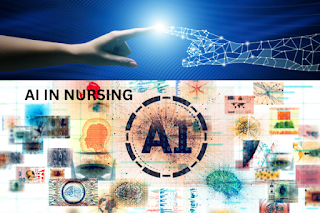How Innovative AI Technology is Transforming the Nursing Industry
How Innovative AI Technology is Transforming the Nursing Industry
Overview
In several areas, including healthcare, the quick advancement of technology has ushered in a new era. Nursing is essential to providing patient-centered care in the healthcare industry. However, the nursing profession faces many difficulties, including a lack of workers, heavy administrative workloads, and the growing complexity of patient requirements. Let's introduce artificial intelligence (AI), a revolutionary force that has the potential to completely transform the nursing field.This article examines how cutting-edge AI technology is revolutionizing the nursing field, tackling pressing issues, enhancing patient care, and paving the way for an exciting future.
Comprehending Cutting-Edge AI Technology
The meaning and elements of artificial intelligence in healthcare
Artificial Intelligence (AI) is the emulation of human intelligence by robots that have been trained to think, learn, and behave similarly to humans. AI in healthcare includes robots, machine learning, natural language processing (NLP), and predictive analytics, all of which are designed to enhance the quality of care.
AI in Nursing Examples
Innovative AI tools are revolutionizing nursing, from sophisticated virtual assistants to wearable devices that monitor vital signs. AI-driven chatbots, for example, help with patient triage, while robotic process automation (RPA) streamlines paperwork and scheduling.
How AI Is Different from Conventional Approaches
AI provides accuracy and efficiency by utilizing real-time data and sophisticated algorithms, in contrast to manual operations. This reduces mistakes and increases the capacity to provide individualized treatment.
AI Applications in Nursing
AI in Monitoring and Patient Care
Through intelligent monitoring devices that continuously measure vital signs and notify nurses of anomalies, artificial intelligence (AI) improves patient care. Additionally, predictive analytics gives nurses the ability to anticipate possible issues and take preventative measures.
AI in Tasks Related to Administration
Nurses have always been tasked with administrative duties, including arranging resources. These duties are streamlined by AI technologies, freeing up nurses to concentrate on patient care rather than paperwork.
AI-Powered Diagnostics
Accurate diagnosis is essential in medicine. Artificial intelligence (AI) systems can evaluate complicated data to detect illnesses early, frequently before symptoms appear. This lessens the burden on healthcare resources while simultaneously saving lives.
AI in Education and Training
AI-powered simulations have revolutionized nursing education. Through the use of virtual reality (VR) and augmented reality (AR), nursing students can practice difficult operations in a safe setting. Training that is tailored to each person's needs is further guaranteed by personalized learning pathways.
AI's Advantages for the Nursing Sector: Improving Patient Results
Better monitoring, prompt interventions, and more precise diagnosis are made possible by AI technologies, which enhance patient happiness and results.
Improving Productivity and Lowering Burnout
AI helps nurses work less by automating tedious chores. This keeps nurses engaged and focused while reducing burnout, a major problem in the field.
Improving Care Coordination and Decision-Making
AI gives nurses data-driven insights that improve decision-making and guarantee smooth care team coordination.
Problems and Issues
Moral Aspects to Take into Account
Ethics issues are brought up by the use of AI in nursing, including the necessity to guarantee equitable access and the possibility of bias in algorithms.
Security and Privacy of Data
Strong security measures are necessary to stop breaches and preserve patient confidentiality because AI systems rely significantly on patient data.
Opposition to Change
Initial challenges may arise because integrating AI necessitates extensive training and a mental shift among healthcare personnel.
Future Directions in Nursing AI
Advanced Nursing Care Robotics
Nurses are assisted in their physical labor by increasingly advanced robotic aides that can lift patients and carry out standard activities.
AI integration with telemedicine AI-powered telehealth services improve access to care by enabling remote consultations and ongoing patient monitoring.
AI for Supporting Mental Health
AI applications and chatbots offer 24/7 support for mental health concerns, lowering the stigma attached to asking for assistance.
How to Use AI in Nursing Homes: A Guide to AI Technology Adoption
Healthcare companies need to evaluate their requirements, choose appropriate AI technologies, and develop a phased adoption strategy.
Nursing Staff Training and Upskilling Thorough training programs guarantee that nurses are proficient in using AI tools, bridging the gap between technology and real-world implementation.
Collaborating with Providers of Technology
Working together with digital firms guarantees access to state-of-the-art AI solutions designed to meet the particular requirements of nursing.
Real-World Case Studies of Effective AI Integration AI-driven systems have been used by hospitals such as Johns Hopkins to forecast patient decline, greatly enhancing patient outcomes.
Hospitals Using AI to Improve Patient Care
AI-powered diagnostic tools and virtual assistants are becoming commonplace in forward-thinking healthcare facilities, improving care quality and efficiency.
In conclusion
The revolutionary potential of AI in nursing cannot be overestimated. AI offers a ray of hope in a subject that needs innovation, from tackling workforce issues to enhancing patient care. Adopting AI technologies provides a route to a more effective, efficient, and compassionate nursing profession as healthcare systems throughout the world struggle with growing demands.
FAQs
What part does AI play in nursing?
AI helps nurses by boosting diagnosis accuracy, expediting administrative duties, and improving patient care.
Does the use of AI in healthcare come with risks?
Indeed, there are possible risks, such as resistance to embracing new technologies, ethical dilemmas, and data security challenges.
Will AI eventually take the place of nurses?
AI is meant to support nurses, not take their place. Instead of replacing human expertise, it enhances it.
How can healthcare facilities begin integrating AI into nursing?
through determining requirements, selecting appropriate AI tools, educating employees, and collaborating with technology suppliers.
What financial effects might using AI in nursing have?
AI systems frequently result in cost savings through better efficiency and fewer errors, despite the fact that early investments can be substantial.





%20(1).png)


%20A%20Must-Have%20Skill%20for%20Modern%20Nurses.png)
.png)





Comments
Post a Comment